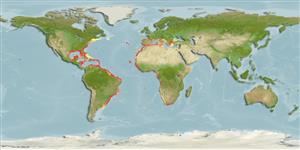Common names from other countries
>
Eupercaria/misc (Various families in series Eupercaria) >
Priacanthidae (Bigeyes or catalufas)
Etymology: Priacanthus: Greek, prion = saw + Greek, akantha = thorn (Ref. 45335).
More on author: Cuvier.
Environment: milieu / climate zone / depth range / distribution range
Οικολογία
Θαλασσινό(ά) Υφαλόφιλο(α); εύρος βάθους 10 - 200 m (Ref. 5403), usually 15 - 100 m (Ref. 10786). Subtropical; 44°N - 40°S, 98°W - 34°E
Tropical and tropically influenced areas of the Atlantic Ocean. Western Atlantic: Canada (Ref. 5951) to Bermuda and at least North Carolina, USA (Ref. 5403) southward to northern Argentina (Ref. 3800). Eastern Atlantic: Madeira to Namibia. Mediterranean (Ref. 50345). Reports from the Indo-Pacific are misidentifications.
Length at first maturity / Μέγεθος / Βάρος / Age
Maturity: Lm ?, range 14 - ? cm
Max length : 50.0 cm TL αρσενικό/απροσδιόριστο; (Ref. 40637); common length : 35.0 cm TL αρσενικό/απροσδιόριστο; (Ref. 3661); μεγ. δημοσιευμένο βάρος: 2.9 kg (Ref. 40637)
Ραχιαίες άκανθες (συνολικά) : 10; Μαλακές ραχιαίες ακτίνες (συνολικά) : 14; Εδρικές άκανθες: 3; Μαλακές εδρικές ακτίνες: 15.
Found on coral reefs and rocky bottoms (Ref. 3800). Forms small aggregations near the bottom (Ref. 10786). A nocturnal feeder (Ref. 5521), feeds mainly on small fishes, crustaceans and polychaetes (Ref. 3800). Most of its prey are larvae. Flesh considered excellent quality; marketed fresh (Ref. 5217).
Life cycle and mating behavior
Maturities | Αναπαραγωγή | Spawnings | Egg(s) | Fecundities | Προνύμφες
Starnes, W.C., 1988. Revision, phylogeny and biogeographic comments on the circumtropical marine percoid fish family Priacanthidae. Bull. Mar. Sci. 43(2):117-203. (Ref. 5403)
IUCN Red List Status (Ref. 130435)
CITES (Ref. 128078)
Not Evaluated
Threat to humans
Reports of ciguatera poisoning (Ref. 31174)
Human uses
αλιεία: περιορισμένης εμπορικότητας; αλιεία αναψυχής: ναί; Ενυδρείο: Εμπορικό(ά)
Εργαλεία
Special reports
Download XML
Διαδικτυακές πηγές
Estimates based on models
Preferred temperature (Ref.
115969): 16.7 - 27.8, mean 24.7 (based on 1098 cells).
Phylogenetic diversity index (Ref.
82804): PD
50 = 0.5002 [Uniqueness, from 0.5 = low to 2.0 = high].
Bayesian length-weight: a=0.01698 (0.01323 - 0.02181), b=2.90 (2.83 - 2.97), in cm Total Length, based on LWR estimates for this species (Ref.
93245).
Τροφικό Επίπεδο (Ref.
69278): 4.0 ±0.0 se; based on diet studies.
Ελαστικότητα (Ref.
120179): Υψηλό, ελάχιστος χρόνος για διπλασιασμό πληθυσμού < 15 μήνες (K=0.7).
Fishing Vulnerability (Ref.
59153): Low vulnerability (25 of 100).
